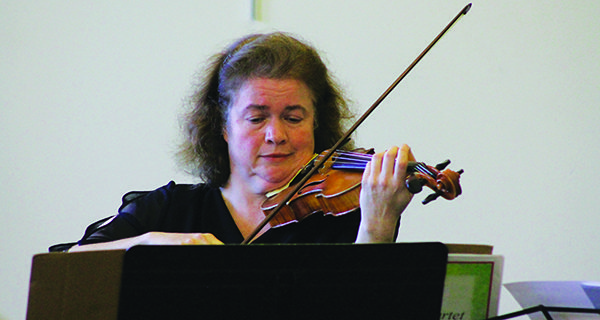[ccfic caption-text format="plaintext"]
By James Kinneen
Hometown Weekly Reporter
On Saturday, the Carol Hunt-Clerici Chamber Music Series presented the Clerici Quartet, which performed “Musical Dances From the Minuet to Tango” in the community room of the Walpole Library. Composed of four musicians, Emilian Badea, Betsy Hinkle, Rebecca Thronblade and Guiomar Turgeon, the group played music from countries like France, Hungary and Romania, ranging in time from the late 1600s to the early 1900s.
Before the music, violinist Guiomar Turgeon noted that the performance was personal and sentimental for her, as her parents spontaneously began dancing after one of her performances when a musician began playing a waltz. While nobody danced in the library, the quartet welcomed them to. In fact, before Badea played the final song, “Libertango” by Astor Piazolla, he joked: “This is your last chance to dance.”
While the classical music was impressive, the quartet’s consistent joking made the room extremely comfortable. Before she played a couple minuets from Boccherini and Beethoven, Turgeon noted that she “became a fan of these from Bugs Bunny,” while before the group played Schubert’s “Serenade,” Badea (who played the accordion throughout) told the crowd how serenades came from men playing guitars outside the windows of the girls they loved. But before they played, he paused and added: “guitars, never accordions,” which drew a laugh.
There was also a lot of learning over the course of the 90-minute concert. For example, the aforementioned Piazolla was in a band that was about to go on tour. His dad didn’t let him go, which was for the best; the plane the band was on ended up crashing and killing everyone onboard. Monti’s “Czardas” from 1904 was about the drinking establishments men were brought to by the locals, before they had to go off to the army.
Badea was the lone soloist, performing some French accordion songs like “Souvenir de Montmartre,” “Flambee Montalbanaise,” (“flambee” because Gustave Viseur’s town was on fire due to the war), and “Reproche.” While he’s Romanian, Badea was so impressed with the French’s collective accordion abilities and compositions that he argued: “The French should have an accordion on their flag - they’re that good.”
Before performing one of Monti’s works, Badea noted that it was “an Italian composer playing Hungarian music, that’s now being performed by a Romanian and three Americans.”
Badea was too humble to tell the truth: it was tremendously difficult music being performed by four incredibly talented musicians.

























